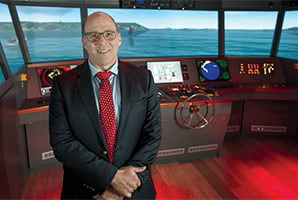However, one issue is the time lag, taking into account the training and seagoing experience required before an officer is ready to take on responsibility. Is that even more of an issue at a time of rapid technological advances?
“We have one eye on digitalisation, autonomous vessels and maritime cybersecurity,” says Tom. “In three to five years, the capability will be there for autonomous vessels. In fact, technically you can do a lot of stuff already. In our own research we can control vessels remotely and make them avoid collisions. All of these things can be done and will happen and who is to say whether the same skill sets and same personality traits will be required.
“But there will be a transition period. And we are already feeding strands of cyber and autonomy into our programmes. We need to be prepared for the impact technology can have and incorporate this into the way we teach and train, and adjust operational procedures.”
Perhaps, he says, a more digitalised future will appeal more to the younger, digital generation. But that brings up another question – how to persuade young people to go to sea when they are so used to constant connectivity and the constant drip feed of social media.
The answer? “You actually find that once that connectivity is limited, they just get on with it. There is this worry that while earlier generations wanted to escape and have adventures, it now seems to be all about safe spaces, and the suggestion that young people are not exposed to risk and don’t understand how to take risk.
“But once you break through on this, we have some really good young people who go out there and do a great job.”
And there is one other big advantage for youngsters taking up Plymouth’s BSc course in Navigation and Maritime Science - a fully funded degree. “With the right sponsorship, you will have no course fees, will receive a living allowance, and have very little debt on graduation.” says Tom. “About 66% of our students are sponsored, and a university education for deck officers provides a great advantage in terms of future career opportunities."
“The image of education for the seafarer is generally further education (FE) or a foundation degree, not higher education (HE) level. And yet these young men and women may be holding the watch on a vessel with perhaps 4,000 people on board and will probably go on to a shore-based role where an HE background may well prove beneficial. There are people out there ready to step up and do a great job.”



